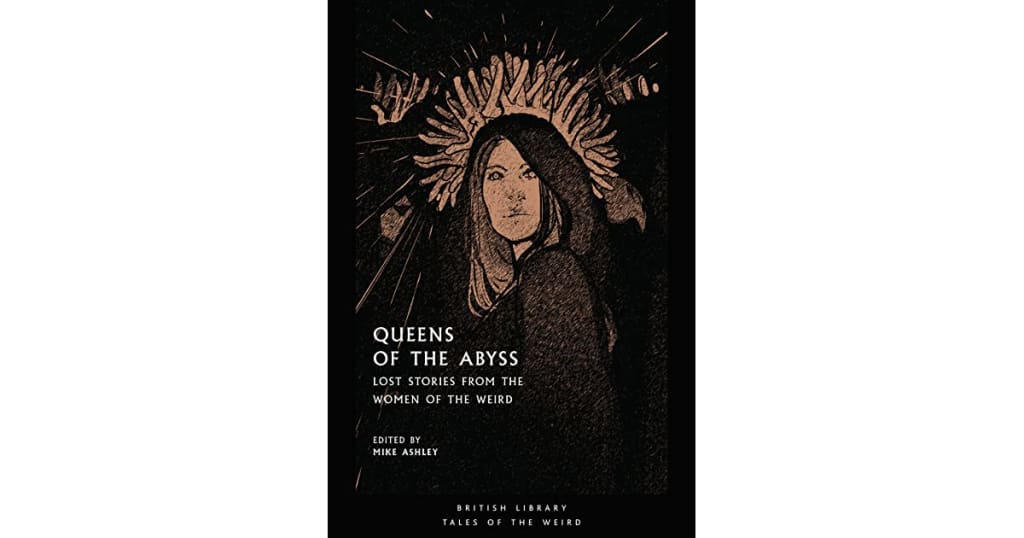Book Review: Queens of the Abyss: Lost Stories from the Women of the Weird
3/5 - What does it mean to be 'weird'?

Watch out. I'm about to get petty.
“Queens of the Abyss” was something by Mike Ashley I was patiently waiting for and when it came out, I had already pre-ordered it. When I began reading it, I was really happy to see that there was a story by Mary Elizabeth Braddon - the writer of books like “Lady Audley’s Secret” and the horror story “The Shadow in the Corner”. When I started reading it, I noticed that not all of the tales were very much ‘weird’ especially in the context of what the book is stating it as. When I read the other tales, not all of them matched up to the Mary Elizabeth Braddon story I read in terms of the contextual weird. The ‘weird’ portrayed by the story by Mary Elizabeth Braddon refers to what is suggestive and supernatural rather than something that is blatant and simply existing which were so in other tales such as the stories by Marie Corelli.
The story by Frances Hodgson Burnett and Violet Quirk are definitely closer to the way in which Mary Elizabeth Braddon writes but the one by Margaret St. Clair, I would say is closer to the works that Mary Elizabeth Braddon’s works outside of the ‘weird’ book. So at this moment, I still do not know what the term ‘weird’ means in this book. I know and have read other books in which the British Library Collection uses the term ‘weird’ and in those books sometimes, it is far more clear as to what the term ‘weird’ means. In the British Library Collection Book “Into the London Fog: Tales from the Weird City”, the term ‘weird’ is very clear. London is represented as the foggy, Victorian-esque city in which the night covering of the fog from the factories creates this landscape for danger and the supernatural. Most of the stories cover place and so, the term ‘weird city’ is more understandable than the term ‘women of the weird’. The only ‘woman of the weird’ I can see in the list is actually Mary Elizabeth Braddon because she is the only one who actively wrote horror stories and sensationalist stuff in order to provoke a reaction.
Be that as it may, many of the stories - without giving you spoilers - are actually very well written. But again, Mike Ashley fails to define the term ‘weird’ because honestly, this is very loose in comparison to another book published by the British Library and is actually edited by a man called John Miller. This book is called “Weird Woods: Tales from the Haunted Forests of Britain”. Again, this is referring to the ‘place’ as being ‘weird’ and so the haunted aspect as written by authors such as: Algernon Blackwood, Walter De La Mare, E.F Benson and M.R James are expected because all of these people are known for writing horror stories. The term ‘weird’ is actually very well applied here. Again, the problem I am having with the term ‘weird’ in the book I have just read was used in a very, very loose way and even was slightly sloppy seeing as only really one of the women in the contents was known for writing sensationalist horror stories.
From “Roarings from Further Out: Four Weird Novellas by Algernon Blackwood” to “The Weird Tales of William Hope Hodgson” and even to the British Library Weird Stories entitled “Evil Roots” which contains stories by Sir Arthur Conan Doyle, Charlotte Perkins Gilman, M.R James, William Hope Hodgson, Nathaniel Hawthorne and a bunch of other authors who are known for sensationalist horror writing - the British Library’s attempt at defining the term ‘weird’ often refers to the stories themselves. But in this context it is reversed to refer to the people writing the stories in which near to none of them are known for writing horror, sensationalist, or even ‘weird’ tales. Even though it states that they are ‘lost’, the British Library is still responsible for their own title in which they should have referred to the women as writers and the stories as weird because let us be perfectly honest, nobody would ever think of Frances Hodgson Burnett as a ‘weird’ woman, would they? The writer of “The Secret Garden”. Weird. Absolutely not.
About the Creator
Annie Kapur
200K+ Reads on Vocal.
English Lecturer
🎓Literature & Writing (B.A)
🎓Film & Writing (M.A)
🎓Secondary English Education (PgDipEd) (QTS)
📍Birmingham, UK






Comments
There are no comments for this story
Be the first to respond and start the conversation.